Caring for Macaws: A Comprehensive Guide to Macaw Food and More
In this blog, we are going to teach you everything you need to know about how to properly care for your macaw including diet, training, and housing.
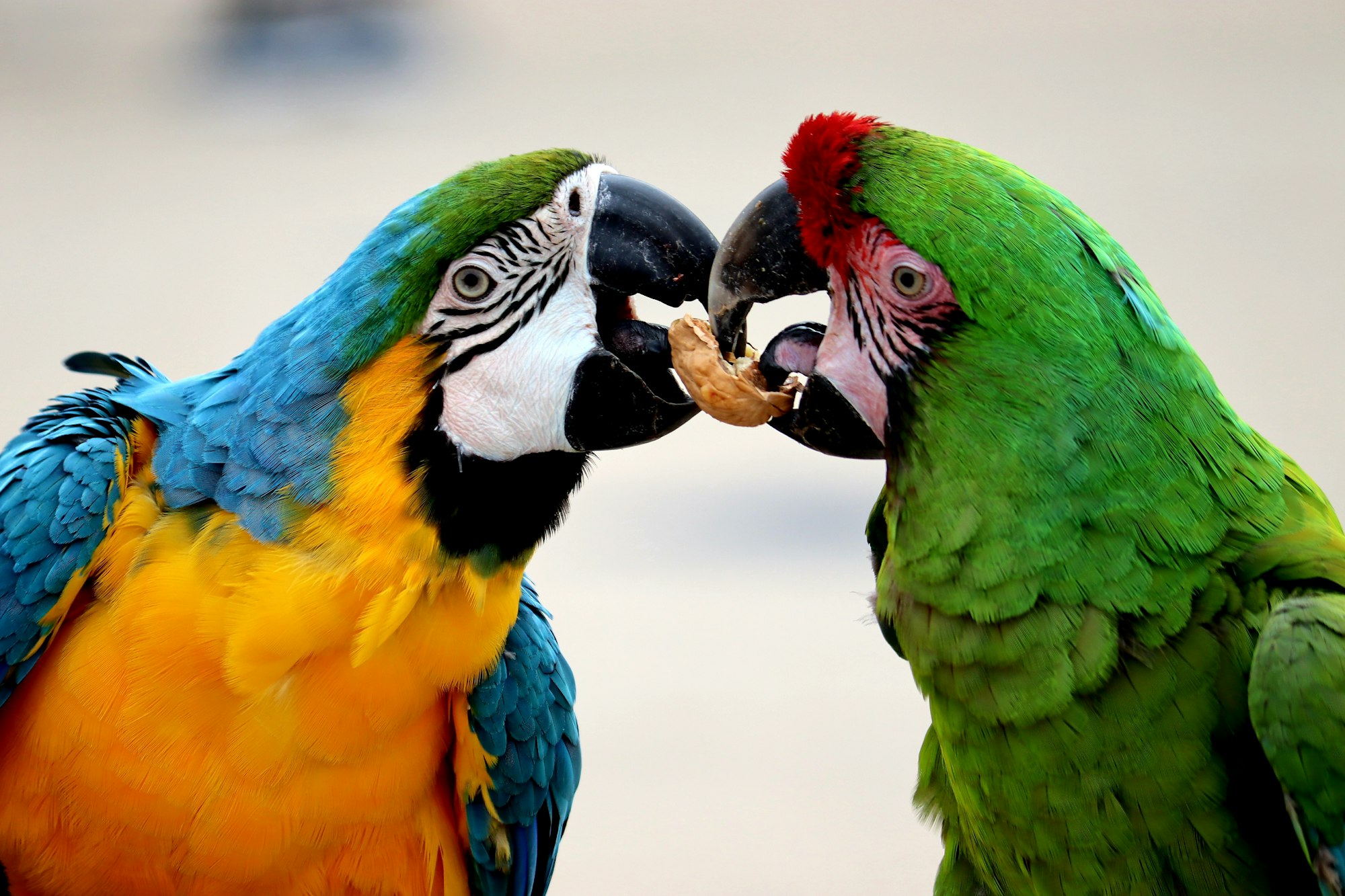
Key Takeaways:
- Balanced Diet: A macaw's diet should include fresh fruits, vegetables, and a mix of pelleted food to ensure they receive all necessary nutrients.
- Training and Socialization: Macaws are intelligent birds that require regular training and social interaction to stay mentally stimulated and well-behaved.
- Health and Care: Regular visits to an avian vet and a proper understanding of their natural habitat can help prevent common health issues in macaws.
Introduction
Macaws are vibrant, intelligent birds known for their striking colors and engaging personalities. These large parrots, native to Central and South America, have become popular pets due to their social nature and ability to mimic human speech. However, caring for a macaw is no small feat. This guide will delve into the essentials of macaw care, including their dietary needs, training tips, and overall health care.
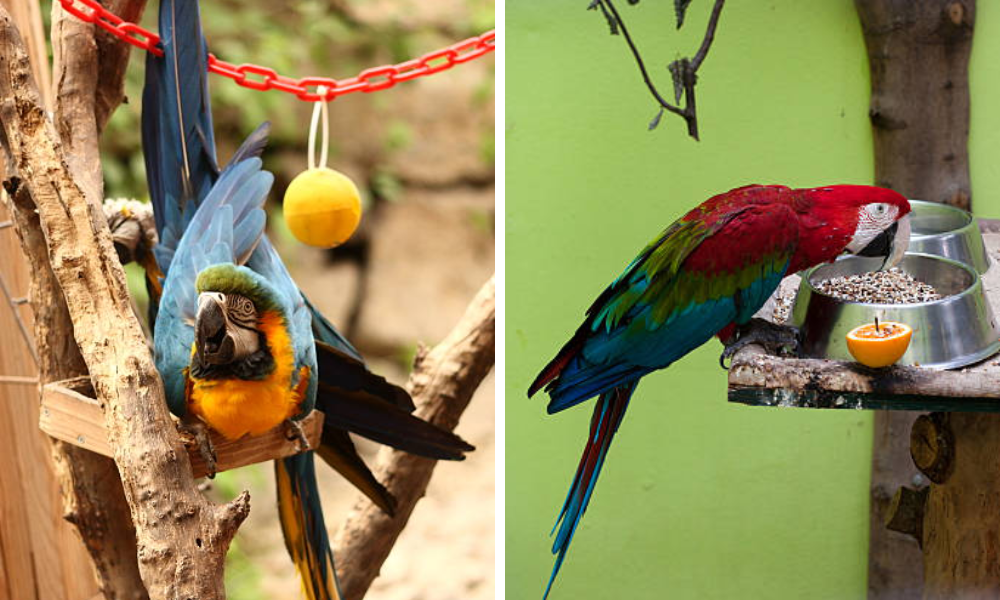
Understanding Blue and Gold Macaw Species
Macaws come in various species, each with unique characteristics. The scarlet macaw, known for its vibrant red, yellow, and blue plumage, varies in size and weight across its range in Central and South America. The Blue and Yellow Macaw, Great Green Macaw, and Military Macaw are some of the most popular species kept as pets. These birds are known for their long tail feathers and large beaks, which they use to crack open nuts and seeds.
Each species has specific needs and behaviors. For instance, the Blue and Yellow Macaw is known for its playful nature, while the Military Macaw is more reserved. Understanding the differences between these species can help you provide better care for your pet macaw.
The Importance of a Balanced Diet
A balanced diet is crucial for the health and longevity of your macaw. In the wild, macaws eat a variety of foods, including fruits, nuts, seeds, and even clay from river banks to neutralize toxins. Unlike other bird species, macaws have unique nutritional requirements that necessitate a diet richer in fats. For pet macaws, a diet that mimics their natural food sources is essential.
Fresh fruits like apples, bananas, and berries should be a staple in your macaw’s diet. Vegetables such as sweet potatoes, sugar snap peas, and leafy greens provide essential vitamins and minerals. Pelleted food is also recommended to ensure they receive a balanced mix of nutrients. Avoid feeding your macaw junk food or all-seed diets, as these can lead to health problems.
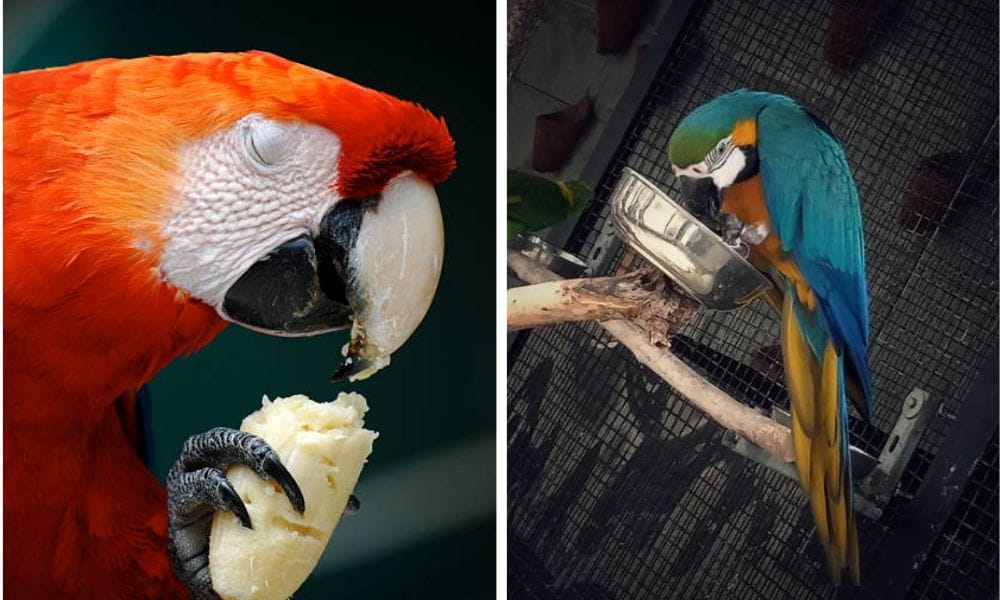
What Do Wild Macaws Naturally Eat?
In the wild, macaws enjoy a diverse and balanced diet that keeps them healthy and vibrant. These magnificent birds forage for a variety of fresh fruits, leaves, seeds, and nuts high up in the treetops. Some of their favorite foods include figs, palm fruits, and seeds from the kapok tree. They also relish leaves, flowers, and buds from various plant species, ensuring they get a wide range of nutrients.
Wild macaws have been observed feasting on:
- Fresh fruits like figs, palm fruits, and berries
- Leaves from trees such as the kapok and fig trees
- Seeds from trees like the kapok and palm trees
- Nuts including almonds and walnuts
- Flowers and buds from various plants
The diet of wild macaws can vary with the seasons and the availability of food in their habitat. However, they consistently maintain a balanced diet by consuming a variety of foods from different sources. This natural diversity is key to their health and well-being.
Fresh Fruits and Occasional Treats
Incorporating fresh foods into your macaw's diet is vital for their well-being. Fresh vegetables like carrots, broccoli, and snap peas should be offered daily. These foods are rich in vitamins and minerals that support your macaw's health.
Occasional treats like scrambled eggs or birdy bread can be given in small quantities. These treats provide extra protein and variety in their diet. However, it's essential to avoid dairy products, as most macaws are lactose intolerant.
How to Convert Your Bird to a Pelleted Diet
Transitioning your macaw to a pelleted diet can be a gradual process, but with patience and persistence, it can be achieved successfully. Here are some tips to help you make the switch:
- Start Small: Begin by introducing small amounts of pelleted food into your bird’s diet. Mix a small quantity of pellets with their regular seed mix to get them accustomed to the new texture and taste.
- Gradual Increase: Slowly increase the proportion of pellets in their diet over time. Every few days, add more pellets and reduce the amount of seed mix.
- Variety is Key: Offer a variety of pellets to ensure your bird gets a balanced diet. Experiment with different brands and flavors to find one that your macaw prefers.
- Fresh Water: Always provide fresh water, as pellets can be dry. Ensure your bird has access to plenty of clean water to stay hydrated.
- Patience and Persistence: Converting to a pelleted diet can take time. Be patient and persistent, and don’t get discouraged if your bird doesn’t take to it immediately.
Popular pelleted foods for macaws include:
- Zupreem Natural Pellets
- Harrison’s High Potency Pellets
- Roudybush California Blend Pellets
By following these steps, you can help your macaw transition to a nutritious pelleted diet that supports their overall health.
Feeding Tips and Tricks
Keeping your macaw healthy and happy involves more than just providing food; it’s about offering the right variety and maintaining cleanliness. Here are some feeding tips and tricks to ensure your bird thrives:
- Fresh Fruits and Vegetables: Offer a variety of fresh fruits and vegetables daily. Carrots, sweet potatoes, kale, and spinach are excellent choices that provide essential vitamins and minerals.
- Balanced Diet: Ensure your macaw’s diet includes a mix of pellets, seeds, and fresh foods. This variety helps meet their nutritional needs.
- Avoid Dairy: Macaws are generally lactose intolerant, so avoid giving them dairy products.
- Limit People Food: While it might be tempting to share your meals with your macaw, remember that birds have different nutritional needs. Limit the amount of people food you offer.
- Clean and Fresh: Keep your bird’s food and water clean and fresh. Change their food and water daily to prevent bacterial growth.
- Coconut Oil: Consider adding a small amount of coconut oil to your bird’s food. It’s a healthy source of fat that can support feather health and overall well-being.
Other treats you can offer your macaw include:
- Sunflower seeds
- Dried fruits like apricots and cranberries
- Nuts such as almonds and walnuts
- Fresh fruits like apples and bananas
Always introduce new foods slowly and in small amounts to prevent digestive upset. By following these tips, you can ensure your macaw enjoys a nutritious and varied diet that supports their health and happiness.
Training Your Macaw
Training is an essential aspect of macaw care. These intelligent birds thrive on mental stimulation and social interaction. Basic training can include teaching your macaw to step up onto your hand, mimic simple words, and perform tricks.
Consistency and positive reinforcement are key to successful training. Use treats like pine nuts or sunflower seeds as rewards. Training sessions should be short and engaging to keep your macaw interested and motivated.
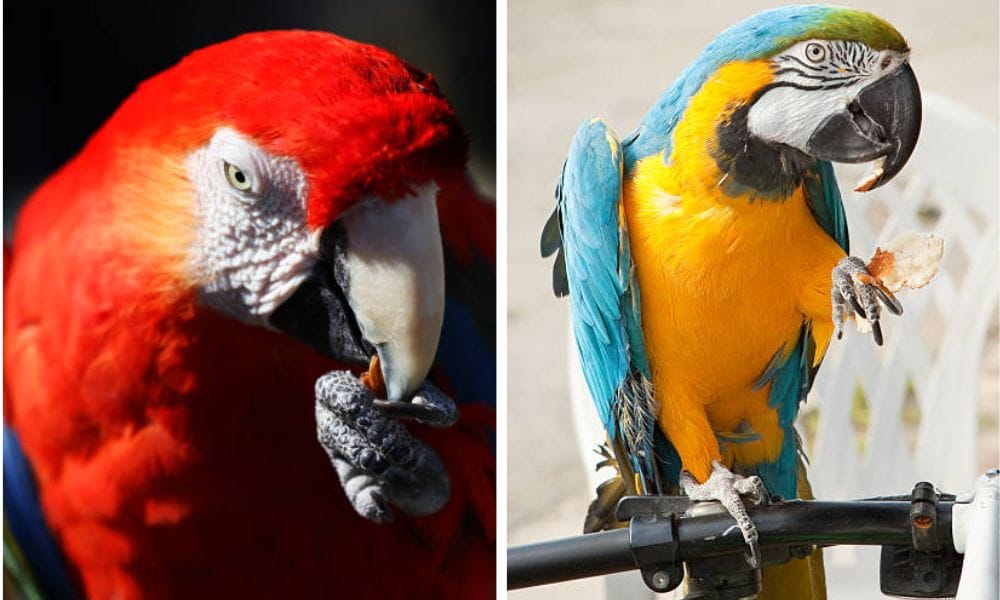
Socialization and Mental Stimulation
Macaws are social birds that require regular interaction with their owners. Without proper socialization, they can develop behavioral issues like feather plucking. Spend time talking, playing, and bonding with your macaw daily.
Providing toys and puzzles can also help keep your macaw mentally stimulated. Rotate toys regularly to prevent boredom. Socialization with other parrots can be beneficial, but always supervise interactions to ensure they get along.
Health and Regular Vet Visits
Regular visits to an avian veterinarian are crucial for maintaining your macaw's health. An avian vet can provide routine check-ups, vaccinations, and advice on diet and care. Early detection of health issues can prevent serious problems down the line.
Common health issues in macaws include feather plucking, respiratory infections, and nutritional deficiencies. A good diet, clean living environment, and regular vet visits can help prevent these problems.
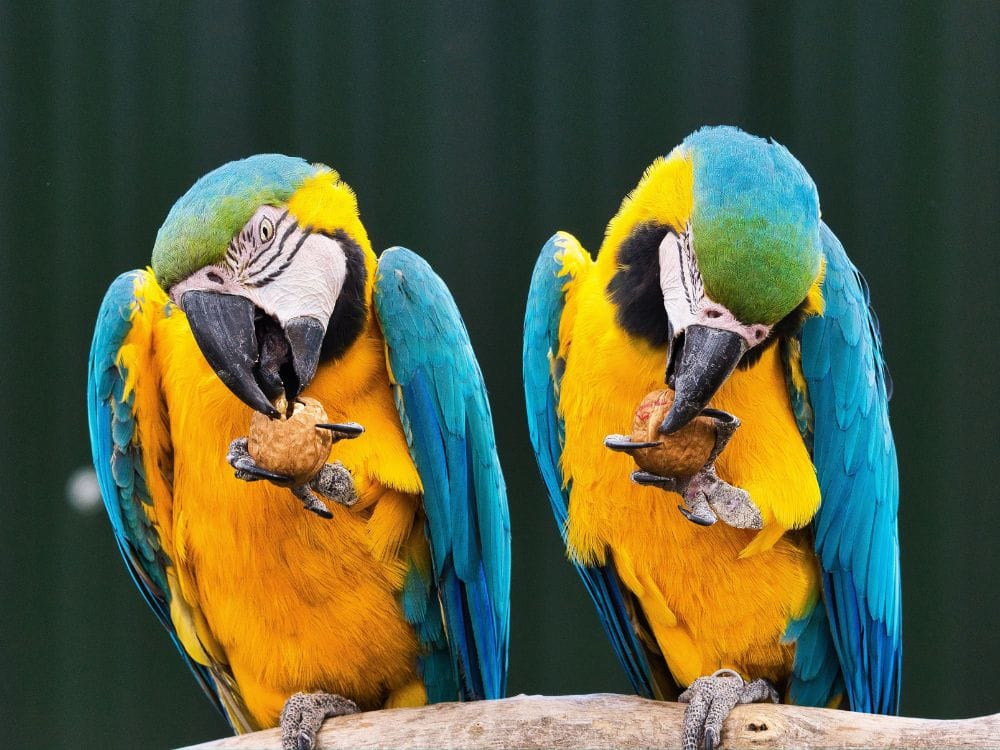
Creating a Suitable Living Environment
A spacious cage with plenty of room for your macaw to move around is essential. The cage should be equipped with perches, toys, and feeding dishes. Ensure the cage is placed in a well-lit area but away from direct sunlight and drafts.
Macaws also enjoy spending time outside their cage. A bird-safe room or aviary can provide them with additional space to explore and exercise. Always supervise your macaw when they are out of their cage to ensure their safety.
Understanding Macaw Behavior
Macaws are known for their vocalizations and can be quite loud. Understanding their behavior can help you manage their noise levels. Macaws use vocalizations to communicate, express emotions, and attract attention.
Providing plenty of mental and physical stimulation can help reduce excessive noise. Training your macaw to use quieter sounds for communication can also be beneficial. Understanding their body language can help you respond appropriately to their needs.
The Role of Clay Licks in a Macaw's Diet
In the wild, macaws visit clay licks to consume clay, which helps neutralize toxins in their diet. While it's challenging to replicate this in captivity, providing a variety of foods can help meet their nutritional needs.
Offering a mix of fresh fruits, vegetables, and pelleted food can help mimic the diverse diet they would have in the wild. Avoid feeding your macaw foods that are high in fat or sugar, as these can lead to health problems.
The Importance of Fresh Water
Fresh water should always be available for your macaw. Change the water daily to ensure it is clean and free from contaminants. Macaws can be messy eaters, so check the water dish regularly for food debris.
Providing a separate dish for bathing can also be beneficial. Macaws enjoy splashing in water and keeping their feathers clean. Regular baths can help maintain their plumage and overall health.
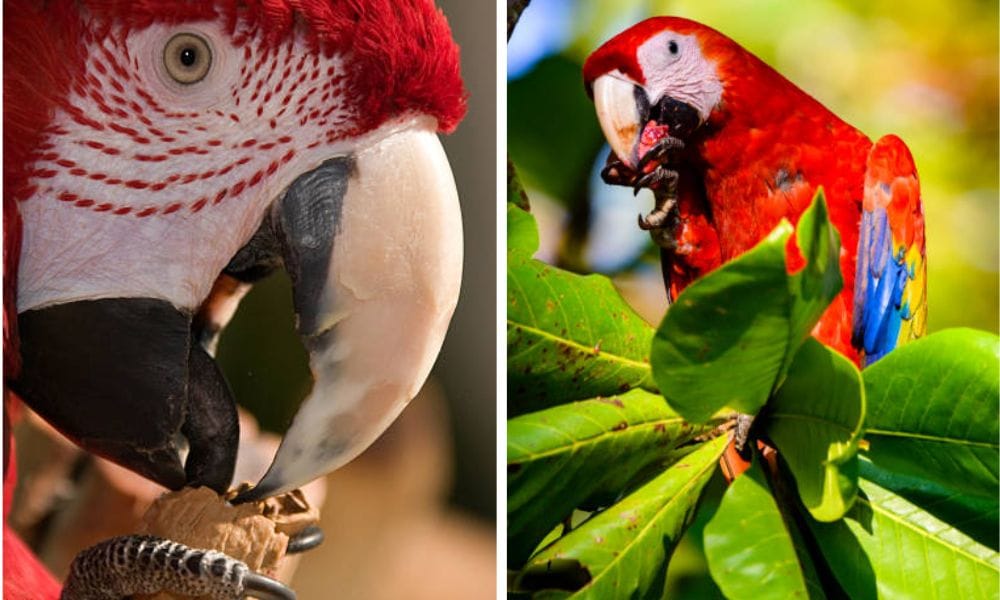
Avoiding Common Dietary Pitfalls
While seeds are a natural part of a macaw's diet, an all-seed diet can lead to nutritional deficiencies. Seeds should be offered in moderation and as part of a balanced diet. Pelleted food is a better option for providing essential nutrients.
Avoid feeding your macaw foods that are toxic to birds, such as chocolate, avocado, and caffeine. These can cause serious health problems and should be kept out of reach.
The Benefits of a Pelleted Diet
Pelleted food is designed to provide a balanced mix of nutrients for your macaw. Unlike seed mixes, pelleted food ensures your macaw receives all the vitamins and minerals they need.
When choosing a pelleted diet, look for high-quality brands that use natural ingredients. Avoid products with artificial colors or preservatives. Pelleted food can be offered alongside fresh fruits and vegetables for a well-rounded diet.
The Role of Amino Acids in a Macaw's Diet
Amino acids are essential for your macaw's health, as they play a crucial role in muscle development and overall growth. Foods like scrambled eggs and certain seeds can provide these essential nutrients.
Including a variety of protein sources in your macaw's diet can help ensure they receive all the necessary amino acids. Consult your avian vet for recommendations on the best protein sources for your macaw.
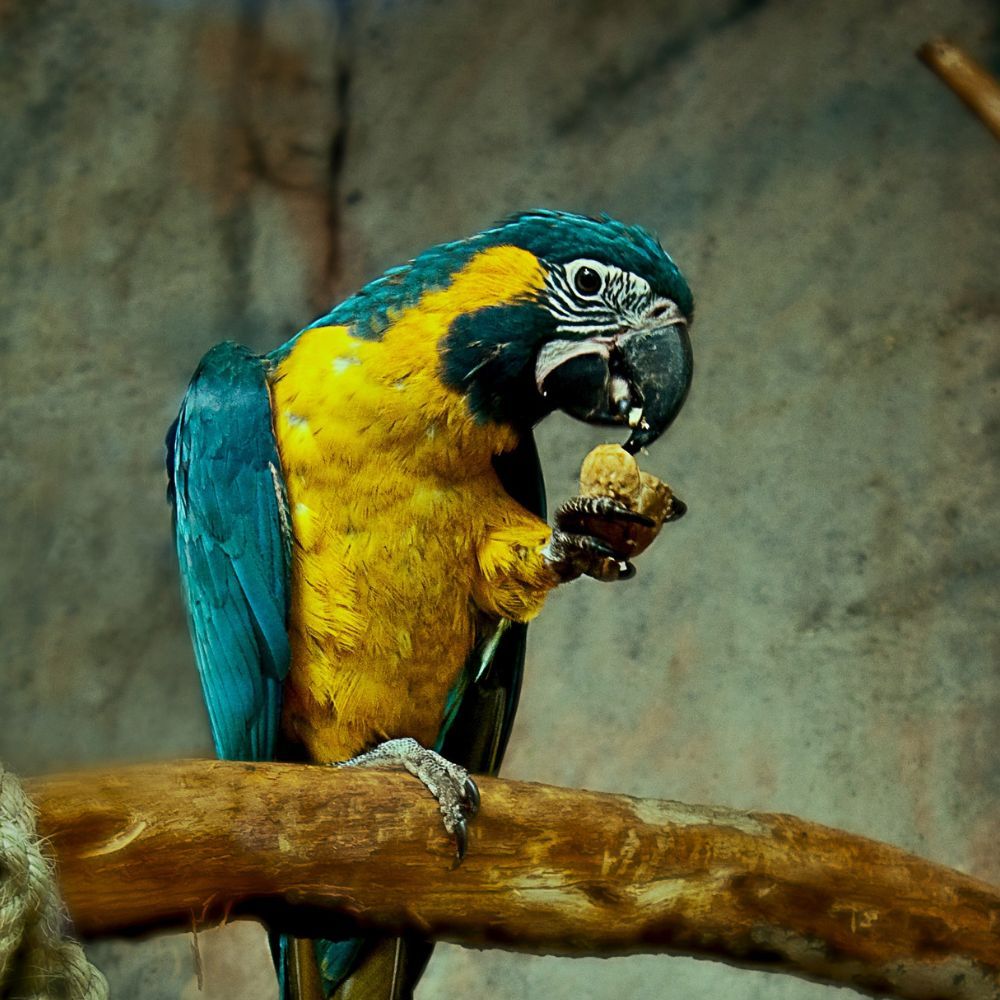
The Importance of Social Interaction
Macaws are social creatures that thrive on interaction with their owners and other birds. Regular socialization can help prevent behavioral issues and keep your macaw happy and healthy.
Spend time talking, playing, and bonding with your macaw daily. Social interaction is essential for their mental and emotional well-being. Consider joining a local bird club or online community to connect with other parrot owners and share tips and advice.
Summary
Caring for a macaw requires a commitment to providing a balanced diet, regular training, and social interaction. These intelligent birds thrive on mental stimulation and socialization, making them great companions for dedicated owners. By understanding their dietary needs, behavior, and health care requirements, you can ensure your macaw lives a long, healthy, and happy life.
FAQ
What should I feed my macaw?
A balanced diet for a macaw includes fresh fruits, vegetables, and pelleted food. Avoid all-seed diets and junk food, as these can lead to health problems.
How often should I take my macaw to the vet?
Regular visits to an avian veterinarian are essential for maintaining your macaw's health. Annual check-ups are recommended, but consult your vet for a schedule tailored to your bird's needs.
How can I prevent feather plucking in my macaw?
Feather plucking can be prevented by providing mental stimulation, social interaction, and a balanced diet. Regular training and playtime can help keep your macaw engaged and happy.
Housing
When deciding on housing, it’s important to consider the size of the bird and their wingspan. An adult macaw needs a cage that is at least 3 feet by 3 feet with vertical bars spaced no more than 1-2 inches apart so they can climb up and down easily. If you plan to keep two macaws together, then the cage needs to be at least 5 feet by 5 feet. Be sure the cage is secure so your macaw does not escape!
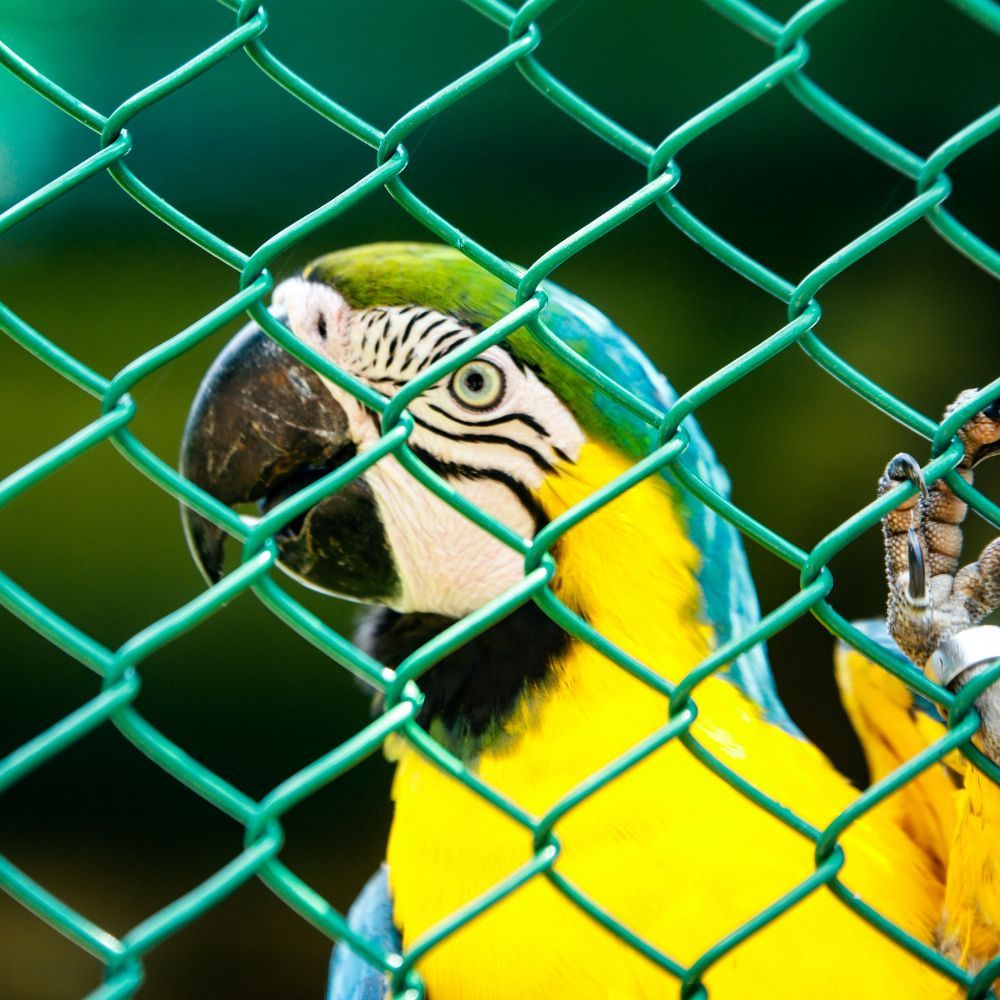
Interaction & Stimulation
Macaws are highly intelligent birds who need plenty of mental stimulation throughout the day in order to stay healthy and active. This includes offering interactive toys such as branches to chew on or things that they can move around such as balls or bells. You should also offer daily opportunities for physical exercise outside their cage; this will help keep their wings strong while giving them time away from the confines of their enclosure. Lastly, it is essential to give your bird plenty of attention and affection; this helps create a bond between you and your feathered friend!
Nutrition
Macaws need proper nutrition for optimal health and energy. A balanced diet should consist of pellets, seed mixes, fresh vegetables, fruits, and nuts (in moderation). Nuts and seeds can be offered as treats in moderation. These can include almonds, walnuts, sunflower seeds, and pumpkin seeds. Additionally, some experts suggest providing small amounts of cooked grains or eggs as an occasional treat. It’s also important to provide plenty of clean water every day and change it frequently.
Caring for macaws requires dedication but can be incredibly rewarding if done correctly! From choosing an appropriate cage size to providing nutritious food options – there are many things that must be taken into consideration when taking care of one of these birds. Additionally, providing mental stimulation through interactive toys and physical exercise will help ensure your bird's overall wellbeing. Taking proper care of a macaw requires patience but ultimately leads to an amazing relationship with a feathered friend! By following this comprehensive guide on how to take care of macaws you can rest assured knowing that your pet will remain happy and healthy for years to come!
As an avid bird-watcher, you know how important it is to choose the best food for your Macaw. Not only is nutrition essential, but providing healthy treats can help keep them happy and content. That's why clicking the link below to see the best food for Macaws available on Amazon is essential! From seeds and nuts to specialized formulas, you can find the absolute best options for your beloved bird. Take a few minutes from your day and visit the link. Your feathered friend will be overjoyed that you did!

